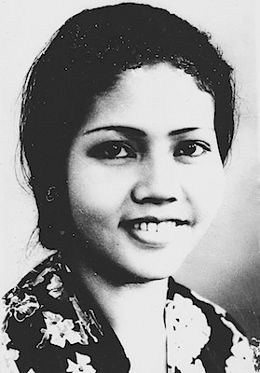
Roekiah, often credited as Miss Roekiah, was an Indonesian kroncong singer and actress. The daughter of two stage performers, she began her career at the age of seven; by 1932 she had become well known in Batavia, Dutch East Indies, as a singer and stage actress. Around this time she met Kartolo, whom she married in 1934. The two acted in the 1937 hit film Terang Boelan, in which Roekiah and Rd Mochtar played young lovers.
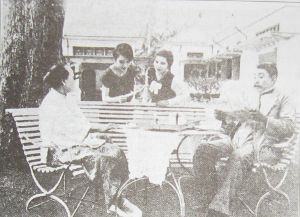
Lilly van Java, also known as Melatie van Java, is a 1928 film from the Dutch East Indies directed by Nelson Wong. Initially meant to be produced by South Sea Film and shot by an American director, the film – which follows a woman told to marry a man she does not love – was ultimately completed by Wong's Halimoen Film. Details on its cast and performance are contradictory, although the film is recognised as the first of a long series of ethnic Chinese-produced films in the country. It is likely a lost film.
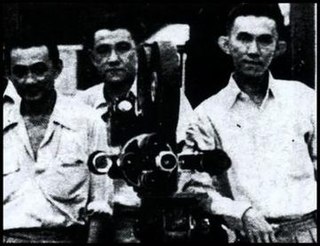
The Wong brothers were three ethnic Chinese film directors and cameramen active in the cinema of the Dutch East Indies. The sons of an Adventist preacher, the brothers – Nelson (1895–1945), Joshua (1906–1981), and Othniel (1908–1986) – received much of their education in the United States before going to Shanghai and establishing The Great Wall Productions.

Roekihati is a 1940 film from the Dutch East Indies. Directed by the brothers Joshua and Othniel Wong and produced by Tan's Film, it follows a young village woman who goes to the city and encounters various difficulties. Targeted at lower-class audiences, it was shot in black-and-white and starred Roekiah and Raden Djoemala.
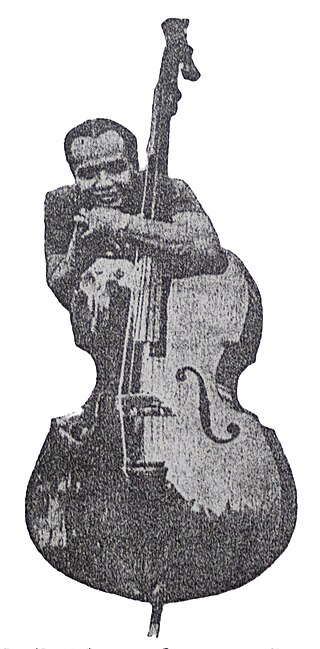
Raden Mas Kartolo was an Indonesian actor and songwriter. Born in Yogyakarta to a noble family, he entered the theatre and married the actress Roekiah around 1933. The two, living in Batavia acted in numerous movies together, starting with the 1938 hit Terang Boelan. However, Roekiah was always cast with other actors as her romantic interest. After Roekiah died in 1945, Kartolo brought the family to Yogyakarta and worked with Radio Republik Indonesia until his death. One of his sons, Rachmat Kartolo, went on to be an actor in the 1960s and 1970s.
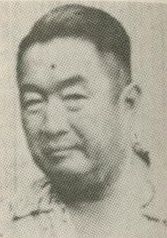
Fred Young was an ethnic Chinese film director and producer active in the Dutch East Indies and its successor state, Indonesia. He reportedly studied film in Hollywood as a youth, but only entered the nation's film industry in 1940. After he made his debut as a writer with Sorga Palsoe, he was involved in some 36 productions, 23 as director.
Tjitra is a 1949 Indonesian film directed by Usmar Ismail for the Dutch-owned production house South Pacific. Starring Raden Sukarno, Nila Djuwita, and Raden Ismail, it follows a man named Harsono who takes a woman's virginity then flees to the city, where he is caught up in a murder case. Ismail's directorial debut, Tjitra was made while its director was still a member of the Indonesian Army. He later disavowed the film, as he felt he had had too little creative input.

Gadis Desa is a 1949 comedy from what is now Indonesia written and directed by Andjar Asmara. Starring Basuki Djaelani, Ratna Ruthinah, Ali Joego, and Djauhari Effendi, it follows the romantic hijinks of a village girl who is taken to be a rich man's second wife. The film, produced by a Dutch-run company, is recognised as the first in which future "father of Indonesian film" Usmar Ismail was involved.

Pah Wongso Pendekar Boediman is a 1941 detective film from the Dutch East Indies. The first production by Star Film, it was produced by Jo Eng Sek and features camerawork by Cho' Chin Hsin. Starring Pah Wongso, Elly Joenara and Mohamad Arief, it follows the social worker Pah Wongso as he investigates a murder to clear his protégé's name.
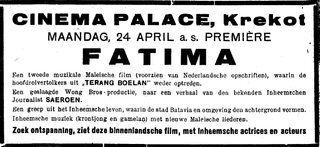
Fatima is a 1938 film from the Dutch East Indies directed by Othniel and Joshua Wong. Written by Saeroen, it starred Roekiah, Rd Mochtar, and ET Effendi and followed two lovers who are disturbed by a rich youth. The film followed the same formula as the earlier hit Terang Boelan, and saw commercial success domestically. It is one of three films which Misbach Yusa Biran credits with reviving the domestic film industry, which had been faltering.

Kedok Ketawa is a 1940 action film from the Dutch East Indies. Union Films' first production, it was directed by Jo An Djan. Starring Basoeki Resobowo, Fatimah, and Oedjang, the film follows a young couple who fight off criminals with the help of a masked man.

Panggilan Darah is a 1941 film from the Dutch East Indies written and directed by Sutan Usman Karim and produced by Tjho Seng Han for Oriental Film. The black-and-white film starred Dhalia and Soerip as orphaned sisters trying to make a living in the colonial capital of Batavia before moving to Kudus to work at a clove cigarette factory.

Srigala Item is a 1941 film from the Dutch East Indies that was directed by Tan Tjoei Hock and produced by The Teng Chun for Action Film. Starring Hadidjah, Mohamad Mochtar, and Tan Tjeng Bok, the film's plot – inspired by Zorro – follows a young man who became a masked vigilante to take revenge against his conniving uncle. Srigala Item was a commercial success, which Misbach Yusa Biran credits to the plot's use for escapism. A copy of the black-and-white film, which featured kroncong music, is stored at Sinematek Indonesia.
Si Tjonat is a likely lost 1929 bandit film from the Dutch East Indies directed by Nelson Wong and produced by Wong and Jo Eng Sek. Based on the novel by F.D.J. Pangemanann, the silent film followed an indigenous man who, having killed his fellow villager, flees to Batavia and becomes a bandit. After kidnapping an ethnic Chinese woman, he is defeated and brought to justice.

Hadidjah was an Indonesian film actress best known for partnership with Moh Mochtar in seven films released by Java Industrial Film between 1939 and 1941. She was the mother of Citra Award-winning musician Idris Sardi.
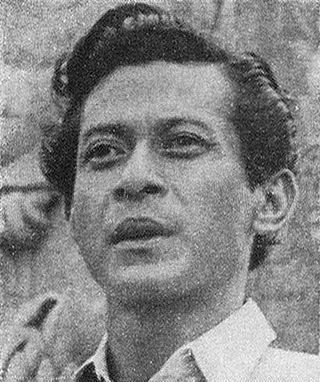
Mohamad Mochtar, usually credited as Moh Mochtar, was an Indonesian film actor active from 1939 until his death in 1981.

Pantjawarna is a 1941 film from the Dutch East Indies.

Star Film was a film production company in the Dutch East Indies. Established by Chinese-Indonesian businessman Jo Eng Sek and Chinese cameraman Cho' Chin Hsin in 1940, it produced five black-and-white films in 1940 and 1941; two of these were directed by Jo, and the remainder were directed by Wu Tsun. Another film was under production when the studio was closed following the Japanese occupation of the Dutch East Indies. Star helped establish the careers of actors such as S Waldy and Elly Joenara, and produced screenplays written by Rd Ariffien and Saeroen; its output, however, is probably lost.

Oriental Film was a film production company in Batavia, Dutch East Indies. Established by ethnic Chinese businessman Tjo Seng Han in 1940, it completed four black-and-white films before it was closed in 1941. All the company's films were screened into the 1950s but may now be lost. They were directed by two men, Njoo Cheong Seng and Sutan Usman Karim, and launched the careers of actors such as Dhalia and Soerip.

















